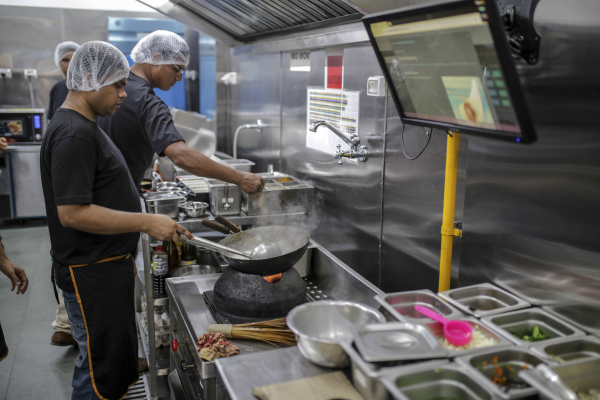The Kroger Co., one of the biggest grocery chains in the Midwest, is dipping its toe into on-demand delivery and the ghost kitchen craze through a partnership with an Indianapolis-based startup, ClusterTruck.
Supermarkets would seem to be logical places to site the kinds of ghost kitchens that have caught investor’s attention over the past few years, and it wouldn’t be the first time that business models from startup companies bubbled up into large national brands, which are better positioned to capitalize on the trends.
Think about the various meal-prep kits that launched and raised millions of dollars before being taken over or copied by big retail groceries. Meal-prep kits are everywhere in the grocery store these days, and supermarkets have had hot food counters dating back decades at least.
Through the partnership with ClusterTruck, Kroger is expanding on a pilot conducted last year, where the grocer set aside 1,000 square feet at participating stores in Carmel and Indianapolis, Indiana and Columbus, Ohio, for ClusterTruck staff to cook meals for delivery and in-store pickup.
“Kroger remains focused on providing our customers with fresh food and experiences enabled by industry-leading insights and transformative technology,” said Dan De La Rosa, Kroger’s group vice president of fresh merchandising, in a statement. “The new on-premise kitchen, in partnership with ClusterTruck, is an innovation that streamlines ordering, preparation and delivery, supporting Kroger as we meet the sustained customer demand for quick, fresh restaurant-quality meals, especially as we navigate an unprecedented health crisis that has affected every aspect of our lives, including mealtime.”
The idea, according to Kroger, is to continue to capitalize on the shift to digital deliveries and sales. In the second quarter of the year, the company said it saw more than 100% growth in its digital sales.
Ghost kitchens (or cloud kitchens) caught investors’ attention when Uber co-founder and former chief executive Travis Kalanick raised over a hundred million dollars to make the idea his next big bet after Uber. Interest and investment into the model, which sees companies offer food prep and storage spaces for would-be food truck and delivery entrepreneurs, soared. Kalanick’s CloudKitchens have gone on to raise several hundreds of millions of dollars and spawned competitors like the Pasadena, California-based company Kitchen United.
Not everyone is convinced that the dark kitchen or cloud kitchen trend is all that it’s made out to be. My colleagues at TechCrunch have taken the idea to task for its reliance on some WeWork -ian assumptions around margins.
But if anything could make the model go, it’s the combination of existing infrastructure and digital efficiencies. That’s likely what Kroger is hoping to leverage.
It’s an interesting experiment at least, and one worth tracking.




